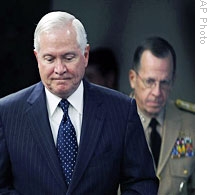Washington
03 September 2009
Top U.S. defense officials are acknowledging that American public opinion appears to be turning against the war in Afghanistan, but they point out the Obama administration's strategy for defeating al-Qaida and the Taliban is just beginning.
 |
| Defense Sec. Robert Gates (L) and Joint Chiefs Chairman Adm. Michael Mullen arrive for a news conference at the Pentagon, 03 Sep 2009 |
A recent public opinion survey conducted by the Washington Post newspaper found that a majority of Americans say the Afghan war is not worth fighting.
Gates says he realizes there is a limited time to show the new policy is effective and he denied that U.S. and NATO forces are in danger of losing the conflict.
"I do not believe the war is slipping through the administration's fingers. The nation has been at war for eight years. The fact that Americans would be tired of having their sons and daughters at risk and in battle is not surprising," said Gates. "I think what is important, is for us to be able to show over the months to come that the president's strategy is succeeding," he said.
Gates points out President Obama's strategy was announced in March and a new U.S. and NATO commander, General Stanley McChrystal, arrived in Afghanistan in June.
Earlier this week McChrystal delivered a classified report assessing the war and many analysts expect he will soon ask for more troops and money to fight the battle.
Mr. Obama has ordered 21,000 additional soldiers to Afghanistan and Gates says the extra troops are still arriving.
"So we are only now beginning to be in a position to have the assets in place and the strategy or the military approach in place to begin to implement the strategy and this is going to take some time," he said.
Gates was joined by Admiral Michael Mullen, the chairman of the Joint Chiefs of Staff.
Mullen, who says security in Afghanistan is "serious and deteriorating," conceded the military must turn the situation around soon.
"You know how much I remain concerned about the situation there. There is a sense of urgency. Time is not on our side. I believe we understand that and I believe we are going to regain the initiative," he said.
The United States has 62,000 troops in Afghanistan, nearly double the number from last year. Other countries have contributed about 39,000 soldiers, although many are not allowed to engage in combat or serve in violent areas of the country.
2009 is the deadliest year for foreign forces in Afghanistan since the current conflict began shortly after the September 11, 2001 terrorist attacks on the United States.